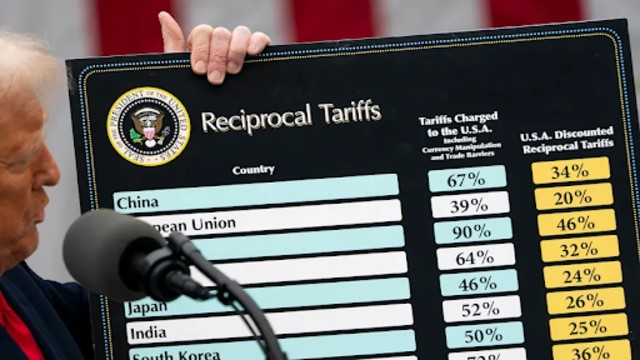
U.S. President Donald Trump holds up a chart covered in a wide array of numbers as he announces 'reciprocal' tariffs on other countries, at the White House on Wednesday. Reuters.
U.S. stock futures plunged Sunday evening, triggering fears of a repeat of Black Monday, as markets reacted sharply to President Trump’s sweeping tariffs on global trading partners. The dramatic dip in futures hinted at a rough start to the week on Wall Street.
By 6 p.m. ET, Dow Jones Industrial Average futures had dropped over 1,700 points. Although the market regained some ground later in the evening, the index was still down nearly 900 points after 10 p.m. This deep slump followed a brutal two-day sell-off the previous week, during which the Dow shed close to 4,000 points.
Echoes of 1987's Black Monday
The sharp decline has sparked alarming comparisons to the infamous Black Monday crash of 1987, when the Dow fell 22.6% in a single day. CNBC’s Jim Cramer warned over the weekend that markets could be heading for a similar catastrophe if the administration doesn't revise its approach.
“If the president doesn’t reach out to countries and reward fair trading partners, the 1987 Black Monday scenario becomes very plausible,” Cramer said on his show Saturday, referencing the swift and steep drop seen nearly four decades ago.
Tariffs Ignite Market Panic
The panic was fueled by the Trump administration’s announcement of massive reciprocal tariffs last Wednesday, followed by swift implementation a day later. These tariffs are aimed at countries the president accuses of exploiting American markets and workers.
While Trump has downplayed the market losses, urging investors to see the dip as a buying opportunity, his aggressive trade policy has rattled global investors. He insists the tariffs are necessary to rebuild U.S. manufacturing and restore fairness in international trade.
Mixed Signals from the White House
In an attempt to calm fears, Trump officials made rounds on Sunday talk shows. National Economic Council Director Kevin Hassett claimed the tariffs would not significantly affect U.S. consumers. Appearing on ABC’s This Week, he said the impact would be “small and manageable.”
Treasury Secretary Scott Bessent echoed this sentiment on NBC’s Meet the Press, calling the tariffs a “one-time price adjustment” and dismissing long-term economic damage.
However, the administration’s stance on the duration of the tariffs remains unclear. Some officials hinted that several countries are already in talks to reduce their tariff exposure, while others suggested the tariffs could remain in place to force long-term trade reform.
Global Leaders Respond
As anxiety spreads across global markets, international leaders are beginning to respond. Israeli Prime Minister Benjamin Netanyahu arrived in Washington on Sunday and is expected to raise concerns about the 17% tariff now imposed on Israeli exports to the U.S.
Senator Roger Marshall (R-Kan.) also weighed in on The Hill Sunday, supporting Trump’s move in principle but expressing hope for eventual tariff elimination. “Ultimately, I want zero tariffs,” he said, “but we must protect U.S. farmers and manufacturers in the meantime.”
A Crucial Week Ahead
With futures flashing red and investors bracing for the unknown, fears of a modern-day Black Monday are taking hold. The coming days will be critical in determining whether markets stabilize—or spiral further into chaos.















